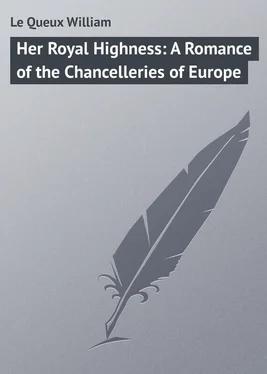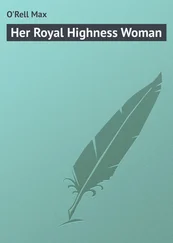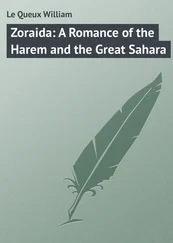William Le Queux - Her Royal Highness - A Romance of the Chancelleries of Europe
Здесь есть возможность читать онлайн «William Le Queux - Her Royal Highness - A Romance of the Chancelleries of Europe» — ознакомительный отрывок электронной книги совершенно бесплатно, а после прочтения отрывка купить полную версию. В некоторых случаях можно слушать аудио, скачать через торрент в формате fb2 и присутствует краткое содержание. Жанр: foreign_prose, на английском языке. Описание произведения, (предисловие) а так же отзывы посетителей доступны на портале библиотеки ЛибКат.
- Название:Her Royal Highness: A Romance of the Chancelleries of Europe
- Автор:
- Жанр:
- Год:неизвестен
- ISBN:нет данных
- Рейтинг книги:4 / 5. Голосов: 1
-
Избранное:Добавить в избранное
- Отзывы:
-
Ваша оценка:
- 80
- 1
- 2
- 3
- 4
- 5
Her Royal Highness: A Romance of the Chancelleries of Europe: краткое содержание, описание и аннотация
Предлагаем к чтению аннотацию, описание, краткое содержание или предисловие (зависит от того, что написал сам автор книги «Her Royal Highness: A Romance of the Chancelleries of Europe»). Если вы не нашли необходимую информацию о книге — напишите в комментариях, мы постараемся отыскать её.
Her Royal Highness: A Romance of the Chancelleries of Europe — читать онлайн ознакомительный отрывок
Ниже представлен текст книги, разбитый по страницам. Система сохранения места последней прочитанной страницы, позволяет с удобством читать онлайн бесплатно книгу «Her Royal Highness: A Romance of the Chancelleries of Europe», без необходимости каждый раз заново искать на чём Вы остановились. Поставьте закладку, и сможете в любой момент перейти на страницу, на которой закончили чтение.
Интервал:
Закладка:
“What!” he gasped, starting and staring at her in amazement. “Then you know Madrid?”
“Yes, I have been in Madrid,” was her answer. “And I have heard in the salons of your mad infatuation for the beautiful opera-dancer. It is common gossip, and most people sigh and sympathise with you, for it is known, too, that Hubert Waldron, of the British Embassy, is the soul of honour – and that such love as his can only bring tragedy in its train.”
“You never told me that you had been in Madrid!”
“Because you have never asked me,” was her calm reply. “But I know much more concerning you, M’sieur Waldron, than you believe,” she said with a mysterious smile. Then, her eyes glowing, she added: “I have heard you discussed in Madrid, in Barcelona, and in San Sebastian, and I know that your love for the beautiful Beatriz Rojas de Ruata is just as fraught with tragedy as the inexorable decree which may, ere long, bind me as wife to the one man whom I hate and detest most in all the world!”
Chapter Five.
A Surprise
Egypt is the strangest land, the weirdest land, the saddest land in all the world.
It is a land of memories, of monuments, and of mysticism; a land of dreams that never come true, a land of mystery, a great cemetery stretching from ancient Ethiopia away to the sea, a great grave hundreds of miles long in which is buried perhaps as many millions of human beings as exist upon our earth to-day.
Against the low-lying shore of the great Nile valley have beaten many of the greatest waves of human history. It is the grave of a hundred dead Egypts, old and forgotten Egypts, that existed and possessed kings and priests and rules and creeds, and died and were succeeded by newer Egypts that now, too, are dead, that in their time believed they reared permanently above the ruins of the past.
The small white steamer lay moored in the evening light at the long stone quay before the sun-baked town of Wady Haifa, close to the modern European railway terminus of the long desert-line to Khartoum.
On board, dinner was in progress in the cramped little saloon, no larger than that of a good-sized yacht, and everyone was in high spirits, for the Second Cataract, a thousand miles from Cairo, had at last been reached.
Amid the cosmopolitan chatter in French, English, Italian and German, Boulos, arrayed in pale pink silk – for the dragoman is ever a chameleon in the colour of his perfumed robes – made his appearance and clapped his hands as signal for silence.
“La-dees and gen’lemens,” he cried in his long-drawn-out Arab intonation, “we haf arrived now in Wady Haifa, ze frontier of Sudan. Wady Haifa in ze days of ze khalifa was built of Nile mud, and one of ze strongholds of ze Dervishes. Ze Engleesh Lord Kig’ner, he make Wady Haifa hees headquarter and make one railroad to Khartoum. After ze war zis place he be rebuilt by Engleesh engineer, as to-morrow you will see. After dinner ze Engleesh custom officer he come on board to search for arms or ammunition, for no sporting rifle be allowed in ze Sudan without ze licence, which he cost fifty poun’ sterling. To-morrow I go ashor wiz you la-dees and gen’lemens at ten o’clock. We remain here, in Wady Haifa, till noon ze day after to-morrow to take back ze European mail from Khartoum. Monuments teeckets are not here wanted.”
There was the usual laugh at the mention of “monuments tickets,” for every Nile traveller before leaving Cairo has to obtain a permit from the Department of Antiquities to allow him to visit the excavations. Hence every dragoman up and down the Nile is ever reminding the traveller of his “monument ticket,” and also that “galloping donkeys are not allowed.”
“Monuments teeckets very much wanted; gallopin’ don-kees not al-lowed,” is the parrot-like phrase with which each dragoman concludes his daily address to his charges before setting out upon an excursion.
Dinner over, many of the travellers landed to stroll through the small town, half native, half European, which has lately sprung up at the head of the Sudan railway.
As usual, Chester Dawson escorted Edna and went ashore laughing merrily. Time was, and not so very long ago, when Wady Haifa was an unsafe place for the European, even by day. But under the benign British influence and control it is to-day as safe as Brighton.
Hubert Waldron lit a cigar, and alone ascended the long flight of steps which led from the landing-stage to the quay. On the right lay the long, well-lit European railway station, beyond, a clump of high palms looming dark against the steely night sky. The white train, with its closed sun-shutters, stood ready to start on its long journey south, conveying the European mail over the desert with half a dozen passengers to the capital of the Sudan.
He strolled upon the platform, and watched the bustle and excitement among the natives as they entered the train accompanied by many huge and unwieldy bundles, and much gesticulation and shouting in Arabic. Attached to the end of the train was a long car, through the open door of which it could be seen that it contained living and sleeping apartment.
At the door stood a sturdy, sunburnt Englishman in shirt and trousers and wide-brimmed solar topee. With him Waldron began to chat.
“Yes,” the English engineer replied, “I and my assistant are just off into the desert for three weeks. The train drops us off two hundred miles south, and there we shall remain at work. The track is always requiring repair, and I assure you we find the midday heat is sometimes simply terrible. The only sign of civilisation that we see is when the express passes up to Khartoum at daybreak, and down to Haifa at midnight.”
“Terribly monotonous,” remarked the diplomat, used to the gay society of the capitals.
“Oh, I don’t know,” replied the Englishman, with a rather sad smile. “I gave up London five years ago – I had certain reasons – and I came out here to recommence life and forget. I don’t expect I shall ever go back.”
“Ah! Then London holds some painful memory for you – eh?” remarked Waldron with sympathy.
“Yes,” he answered, with a hard, bitter look upon his face. “But there,” he added quickly, “I suppose I shall get over it – some day.”
“Why, of course you will,” replied the diplomat cheerfully. “We all of us have our private troubles. Some men are not so lucky as to be able to put everything behind them, and go into self-imposed exile.”
“It is best, I assure you,” was the big, bronzed fellow’s reply. Then noticing the signals he shouted into the inner apartment: “We’re off, Clark. Want anything else?”
“No,” came the reply; “everything is right. I’ve just checked it all.”
“We have to take food and water,” the engineer explained to Waldron with a laugh. “Good night.”
“Good night – and good luck,” shouted Hubert, as the train moved off, and a strong, bare arm waved him farewell.
Then after he had watched the red tail-light disappear over the sandy waste he turned, and wondering what skeleton of the past that exile held concealed in his cupboard, strode along the river-bank beneath the belt of palms.
How many Englishmen abroad are self-exiles? How full of bitterness is many a man’s heart in our far-off Colonies? And how many good, sterling fellows are wearily dragging out their monotonous lives, just because of “the woman”? Does she remember? does she care? She probably still lives her own life in her own merry circle – giddy and full of a modern craving for constant excitement. She has, in most cases, conveniently forgotten the man she wronged – forgotten his existence, perhaps even his very name.
And how many men, too, have stood by and allowed their lives to be wrecked for the purpose of preserving a woman’s good name. But does the woman ever thank him? Alas! but seldom – very seldom.
Читать дальшеИнтервал:
Закладка:
Похожие книги на «Her Royal Highness: A Romance of the Chancelleries of Europe»
Представляем Вашему вниманию похожие книги на «Her Royal Highness: A Romance of the Chancelleries of Europe» списком для выбора. Мы отобрали схожую по названию и смыслу литературу в надежде предоставить читателям больше вариантов отыскать новые, интересные, ещё непрочитанные произведения.
Обсуждение, отзывы о книге «Her Royal Highness: A Romance of the Chancelleries of Europe» и просто собственные мнения читателей. Оставьте ваши комментарии, напишите, что Вы думаете о произведении, его смысле или главных героях. Укажите что конкретно понравилось, а что нет, и почему Вы так считаете.












